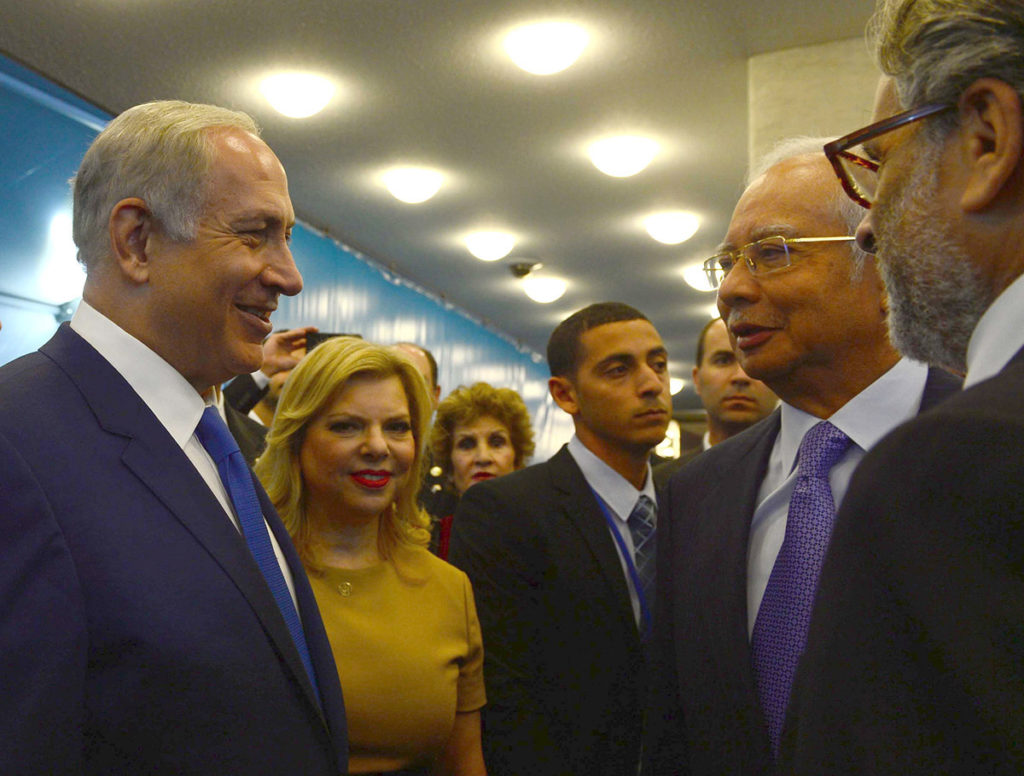Australia/Israel Review
Asia Watch: Close encounters
Oct 30, 2015 | Michael Shannon

The moment came and went in seconds. Yet, the chance encounter between Malaysian Prime Minister Najib Razak and his Israeli counterpart Binyamin Netanyahu in a corridor at the United Nations building in New York generated a torrent of chatter.
Najib explained that he had bumped into Netanyahu at a doorway at the UN headquarters, and that the handshake was impromptu. He was forced to decry “slander” after a picture of the smiling prime ministers was circulated online, but his explanation of the unplanned incident did little to quell his critics at home, notably the Parti Islam se Malaysia (PAS).
PAS information chief Nasruddin Hassan charged that in the midst of the current Israeli-Palestinian violent skirmishes, “Najib betrayed the efforts of the Muslim world in pressuring and boycotting Israel, when he shook the Israeli PM’s hand as if they were friends and nothing happened. His (UN General Assembly) speech accusing Israel of systematic ethnic cleansing is no more than a political gimmick, now shadowed by the handshaking incident.”
Adding to the volume of commentary was a report in the Times of Israel that speculated upon a possible olive branch to the Jewish state in PM Najib’s speech to the UN. The Times said that although Najib was critical of Israel’s actions during recent violence in Jerusalem, he had also called for improvements in Muslim-Jewish relations, which was a departure from the generally hostile tone taken by previous Malaysian prime ministers against Israel.
Najib referenced the Torah and ancient Jewish sage Hillel in his speech: “Given the Rosh Hashanah violations of Al-Aqsa Mosque in Jerusalem and aggression against its worshippers three weeks ago, I call on the Israeli government to live up to Judaism’s highest ethical principles, and the essential message of the Torah.”
“When asked to describe the Torah in a soundbite, (Hillel) said: ‘That which is hateful to you, don’t do to your fellow human being.’ This dictum, known universally in all religions as the Golden Rule, could herald the dawn of a much needed revised relationship between Muslims and Jews,” Najib said.
Was Najib reaching out to the collective Jewish soul? It is more likely that the Judaic references were a rhetorical flight of fancy rather than hinting at a shift in policy.
While Najib is not the first Malaysian leader to project a moderate image abroad, he also follows a succession of leaders wedded to deeply entrenched domestic policies (hardly surprising when only one party coalition has governed since federation in 1963).
It is not such a stretch to include the stance on Israel-Palestine in the domestic sphere as it’s an issue that plays out time and again, with politicians being demonised as being pro-Israel and Jewish-friendly under the most flimsy pretexts by both the Government and Opposition to discredit and smear their political foes.
The official anti-Israel position is very clear. Malaysia is the only country in the world whose passports contain a line of text printed at the very front of the document: “This passport is valid for all countries except Israel.” (Exceptions are made, however, for pilgrimages to the Holy Land.)
There are a number of Malaysian NGOs which receive direct and indirect public funding from the government such as Viva Palestina Malaysia, Aman Palestin, and Aqsa Syarif which are very active in advocating the Palestinian cause and highlighting alleged Israeli injustices. Antisemitic statements regularly feature in political campaigns and during religious sermons.
Yet there is another way to view the Malaysia-Israel question, stated with rare clarity in a recent opinion piece by Azrul Mohd Khalib, a moderate and liberal social activist, in the Malay Mail Online.
He wrote that the fuss over the Najib-Netanyahu encounter was so overblown that “you would have thought that Najib had high-fived Satan himself,” and Malaysians have “short and selective memories” regarding Israel, noting that Israel had voted in favour of Malaysia’s entry into the United Nations in 1957 and there had been direct communication with both David Ben-Gurion and Golda Meir by past Malaysian leaders.
Furthermore, despite a ban on direct commerce with Israel since 1974, trade between Malaysia and Israel is worth hundreds of millions annually.
“Though conducted discreetly and often transacted through intermediate countries such as Thailand and Singapore, the Israeli Central Bureau of Statistics records show that in 2013, the total trade between Malaysia and Israel reached US$1.529 billion, almost double from the previous year,” he writes.
Azrul concludes that “The current positioning vis-à-vis Israel stems from the sense of Islamic solidarity with the Arab countries and being a part of the Muslim ummah.”
This article is featured in this month’s Australia/Israel Review, which can be downloaded as a free App: see here for more details.






